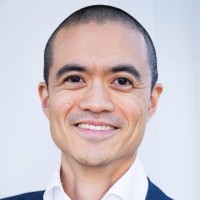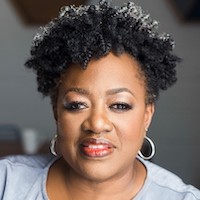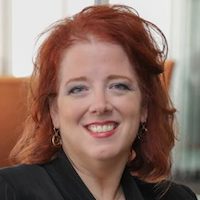Career Coaches and Michigan Ross Alumni Offer Advice for Job Seekers in 2022

If you’re looking to make a job change in 2022, you may have some questions. What’s the job search climate like right now? What special challenges has the pandemic created? Which pitfalls should I try to avoid?
A number of Ross School of Business alumni work as professional career/executive coaches, and they have answers to these questions and more. Dividend asked several of these Ross alums for their perspective on the job market in 2022.
The respondents are:
Stephanie Judd and Kara Davidson, MBA/MS SEAS ’13, interview and presentation coaches and founders of Wolf & Heron, a storytelling consultancy
Mark Kroening, MBA/MPP ’17, leadership and organization effectiveness coach
Joseph Liu, MBA ’07, career change consultant, Career Relaunch podcast host
Jennifer Nash, MBA ’10, executive advisor, behavioral leadership coach, career strategy consultant for executives
Tina Schust Robinson, MBA ’99, executive coach and leadership development consultant
Linda R. Taliaferro, MBA ’08, senior executive, career advisor, and Being Brown at Work podcast host
These Michigan Ross alumni coaches are available for paid consultations with their fellow Ross alumni and can be contacted through the Career Coaches page of the Michigan Ross website. Ross alumni also have access to complimentary career coaching services from Lisa Morgan, in-house career coach at Ross.
What's different in the job market and career search landscape now, compared to the end of the Great Recession?

 Judd and Davidson: Today, people are a lot choosier and have higher expectations of their employers than ever before. After the Great Recession, job seekers were just happy to have a job again. This time, the pandemic has resulted in a major shift to remote work, work/life integration, flexibility, and freedom, so job searchers are choosier about the kind of job that will meet their needs. Even though employers now have more freedom to hire without regard to geography (for many roles) they’re struggling to find great talent. We’re looking at a job market right now that has the job searcher in the driver’s seat.
Judd and Davidson: Today, people are a lot choosier and have higher expectations of their employers than ever before. After the Great Recession, job seekers were just happy to have a job again. This time, the pandemic has resulted in a major shift to remote work, work/life integration, flexibility, and freedom, so job searchers are choosier about the kind of job that will meet their needs. Even though employers now have more freedom to hire without regard to geography (for many roles) they’re struggling to find great talent. We’re looking at a job market right now that has the job searcher in the driver’s seat.
Liu: Compared to the period coming out of the Great Recession, where people were returning to “the way things used to be,” the pandemic has opened the doors to new ways of working and forced people to reevaluate what truly matters to them and what steps they can take in their lives and careers to honor their personal and professional priorities.
Taliaferro: What’s different now is the mindset shift among job seekers. This time, their focus is on receiving market value for their expertise and being very selective in the corporate cultures they choose.
Robinson: The pandemic has encouraged (and sometimes forced) us to prioritize what's most important in our lives. We've had to balance work, family, self, and community in unexpected ways, learning lessons along the way. For those with the financial flexibility to make career changes, the pandemic led to what's been coined the “Great Resignation” — a surge in professionals seeking opportunities that provide more balance and autonomy, a greater sense of purpose, and more of what brings joy. What remains true regardless of the economic shift is the critical need to understand ourselves, recognize our strengths and offerings, and define what we truly need from work.
Kroening: It does appear to be an environment where there is more flexibility and some of the “power” has shifted back to the prospective employee.
Nash: There are three key job market/career search differences between the Great Resignation and the Great Recession. First and foremost is the balance-of-power shift created by the pandemic. Companies are no longer in the driver's seat when it comes to defining how, where, and when employees work. Second, due to COVID-19, employees have had space and time to reflect on what's truly important to them. They insist on infusing purpose, passion, impact, and values into their current and future work, and if they can't do so, they are voting with their feet. Third, COVID-19 revealed an ugly truth: The majority of leaders lack people leadership skills. With human and relational skills in short supply, job seekers with these key skills are in high demand now more than ever. Job seekers should be sure to highlight these critical skills on resumes, during interviews, and in cover letters.
What's the biggest change you are seeing in career searches from the beginning of the pandemic to now?
 Robinson: I am delighted to see professionals prioritizing purpose, flexibility, and autonomy. Folks who prioritize title and money continue to pursue those roles, but many are asking questions today they would not have asked a few years ago. Can I work fully remote? How often do I need to be in the office? LinkedIn has exploded with positions that are fully remote as employers realize just how productive we can be without setting foot in an office — or at least having more autonomy over our in-office schedules.
Robinson: I am delighted to see professionals prioritizing purpose, flexibility, and autonomy. Folks who prioritize title and money continue to pursue those roles, but many are asking questions today they would not have asked a few years ago. Can I work fully remote? How often do I need to be in the office? LinkedIn has exploded with positions that are fully remote as employers realize just how productive we can be without setting foot in an office — or at least having more autonomy over our in-office schedules.
Taliaferro: The intentionality to bridge the gaps within one's personal life. No longer is the career search about landing a job, it's about landing the job that meets the seeker’s desires in their entirety. Also, corporations are being faced with truly assessing the definition of “the workplace.” There is a push to be more nimble and flexible. Corporations are being driven to show that they value inclusion and are doing so in a psychologically safe manner.
Nash: Career seekers are gaining clarity on what they want and don’t want. I see more people exiting traditional 9-to-5 to test the entrepreneurial waters. I also see many exploring 21st century startup environments as opposed to 20th century organizations.
Judd and Davidson: At the beginning of the pandemic, a lot of folks lost their jobs and were desperately searching for something to ground themselves through all the chaos, confusion, and uncertainty. Many of those folks never did find a full-time job to replace the one they lost, but they did find a new rhythm. They got contract work, spent time at home with their families, and most of all, reset their priorities. Now it feels like employment is much more in the hands of the employee than the employer. People are able to craft their jobs, and contract negotiations reach well beyond pay and vacation time.
Liu: Candidates have gone from being quite cautious and conservative to optimistic and aspirational, likely a result of the shift from an employer's to a candidate's marketplace and the desire to do more fulfilling work.
What should alumni contemplating a career or job change in 2022 be doing — first, second, and third?
 Liu: First, reassess exactly what your top goals are. Second, reposition your personal brand in a way that enables you to stand out. Third, take proactive action to pursue those opportunities that energize you the most.
Liu: First, reassess exactly what your top goals are. Second, reposition your personal brand in a way that enables you to stand out. Third, take proactive action to pursue those opportunities that energize you the most.
Taliaferro: First, get extremely clear on the why — the reason for the change. Understanding that will greatly support a successful transition. Second, do a thorough assessment of the feedback previously received and bridge all necessary gaps. Third, make sure your network is intact. Relationships are everything!
Robinson: First, assess where you've been, what you've been doing, and how to maintain a desired lifestyle. What have you liked? What have you outgrown? How much money do you need vs. want to live a joyful life? Second, align the four Ps of your personal brand — (super) powers, passion, priorities, and purpose. Third, ask for what you want — engage in conversations with connections, expand your community, practice your "elevator" speeches, and clearly articulate your “what next.” Your “marketing collateral” (resume, LinkedIn, cover emails, etc.) should reflect this contemplation – and yet many job seekers start with the tactical and hope to back into the purposeful.
Nash: First, take care of yourself. Make healthy food choices. Get sufficient sleep. Take time for friends and family. Get exercise and move your body. Second, make time to do a deep dive and look inside. What motivates you to do your best work? Third, look outside. Which work cultures empower you to perform at your best? Which leadership styles bring out the best version of you? Where do you work best? Fourth, understand your strengths. What are they? How do you prefer to use them in the workplace? Which might you be overusing? Fifth, discover your “why.” What is it that your heart wants from your career? How do you want to contribute to the world? When you have clarity on these items, then reach out to build your network, strengthen relationships, and conduct due diligence for your job search.
Kroening: Continually sharpen one’s purpose and build comfort in leading with that, as opposed to a specific function or role.
Judd and Davidson: We’re storytellers, so when we work with clients, we focus heavily on their career narrative and the stories they tell. First, we spend time with them unpacking the “why” of the change. Your motivation is important to understand and articulate in order to ensure the conversations and interviews are supported and framed with vision and authenticity. Additionally, this helps develop clarity around the kinds of roles and organizations that will make the most sense to pursue. Then we can get into the specifics of potential interview stories or stories they can use to introduce themselves when networking. These stories are important because they connect the past to the future. Then it’s all about practice.
What are the fantastic opportunities you see for our job-seeking alumni?
 Taliaferro: Excellent executive opportunities exist in the manufacturing, nonprofit, and service industries. Tech and startups are available as well.
Taliaferro: Excellent executive opportunities exist in the manufacturing, nonprofit, and service industries. Tech and startups are available as well.
Nash: Fintech is hot right now, as are talent and sales. This is the time for you to realize the dream job you've always wanted. Get after it.
Kroening: More awareness of and about global challenges — possibly more interesting work, more flexible working arrangements.
Liu: I've seen professionals finally make the leap to do work they find more meaningful, whether that's switching gears to pursue a career that truly excites them, insisting on more flexible work arrangements, or launching their own ventures.
Judd and Davidson: Because the job market is hot, and the “Great Resignation” persists, folks in an active job search are actually in a position of more power than they may even know. There is so much opportunity right now to negotiate for side benefits, flexibility, vacation time, virtual work, etc. that allows you to really craft a job that fits your life rather than shaping your life to fit your job.
Robinson: Wildly creative opportunities to work from anywhere for companies that never before embraced remote employment. Unprecedented flexibility to live where you want and still work in desired industries. And continued demand for candidates with learning agility, EQ, critical thinking, and ability to persuade and influence.
What are the cautionary tales or “watch-outs” that you would advise alumni to beware of in a search?
 Nash: Apparently there's a current trend of disgruntled and Great Resignation employees bashing their toxic bosses and employers on TikTok and Instagram. Don't burn bridges — stay classy. Also, during the pandemic, work clothing preferences shifted to more casual wear. But first impressions are still critically important. While casual might be appealing, take care to dress professionally for video interviews. Prepare your interview logistics and do a test run: Ensure proper room lighting, operational audio/video, camera distance/height, notes, water, pen, and paper.
Nash: Apparently there's a current trend of disgruntled and Great Resignation employees bashing their toxic bosses and employers on TikTok and Instagram. Don't burn bridges — stay classy. Also, during the pandemic, work clothing preferences shifted to more casual wear. But first impressions are still critically important. While casual might be appealing, take care to dress professionally for video interviews. Prepare your interview logistics and do a test run: Ensure proper room lighting, operational audio/video, camera distance/height, notes, water, pen, and paper.
Taliaferro: Sitting back and letting the electronic resume systems with special algorithms take control. Also, not being properly prepared for video interviews. Taking them lightly and not being fully, visibly engaged is dangerous. Not being able to clearly and robustly articulate your experiences, successes, and differentiating skills.
Liu: Although some indicators suggest we’re shifting back toward a candidate's marketplace, you should avoid coming across as being too demanding or aggressive in your job hunt during a time when people are still dealing with the professional and personal challenges of the pandemic. Patience remains key at a time when upheaval and uncertainty are still present in each of our lives.
Judd and Davidson: We hear stories about how folks sign on the dotted line with a promise that they can have access to a benefit after a certain “wait period.” For example, they can work remotely three times a week, or shift their schedule to more flexible hours after the first six months. This is dangerous in an economy with this much uncertainty. Policies can change and organizations can go back on their promises. As a general “watch out,” we’d say that if you accept a job with conditional components, make sure you’d be at peace with it even if the conditional components of the offer are never met.
Robinson: Don't forget the basics. Career success does not begin with a resume and a LinkedIn refresh. It starts with a long, hard look inward at your talents and interests, at the pieces of past jobs that excited you most, at what you do not want. And don't forget that networking still is critical. Applying for jobs on websites without any contact on the inside is a bit like playing slots in Vegas — you might hit it big, but you're more likely to wear out your fingers and lose a bunch of tokens.
What final words of wisdom would you share?
 Kroening: Think of the process as a learning-by-doing journey, commit to it, and spend the time answering the more relevant questions that come up — trusting that a great outcome (or next step) will result.
Kroening: Think of the process as a learning-by-doing journey, commit to it, and spend the time answering the more relevant questions that come up — trusting that a great outcome (or next step) will result.
Nash: Those who succeed do so because they have created alignment between their internal world and external environment. Job searching requires mental, emotional, and physical investment; it can be very taxing and stressful. Pay attention to your body’s signals. Give your brain and body what they need to recharge and refuel for peak performance.
Judd and Davidson: Searching for a job is not fun for most people. It can feel really exhausting and frustrating to experience rejection rather continuously. Remember, it’s often not even about you. Take time to break the job search into little tasks that are manageable, like making a list of employers, looking at the job boards, applying for one job a day, etc. Doing small things like that build momentum. And reward yourself for every rejection.
Robinson: Know yourself. Trust yourself. And give yourself permission to flourish and thrive, not just survive. Surround yourself with support — friends, family, and coaches.
Liu: While the pandemic has certainly been challenging, with the right attitude and proactive approach, you can use this time as an opportunity to recalibrate and create the kind of life and career you find truly meaningful. But the onus really is on you to take the brave steps necessary to make it happen.
Taliaferro: Being good at what you do is the price of entry. It's expected. Make sure that you are equally strong, if not stronger, in being. As stated previously — relationships are everything. And the old adage is definitely true — It's not your IQ but your EQ that matters!







